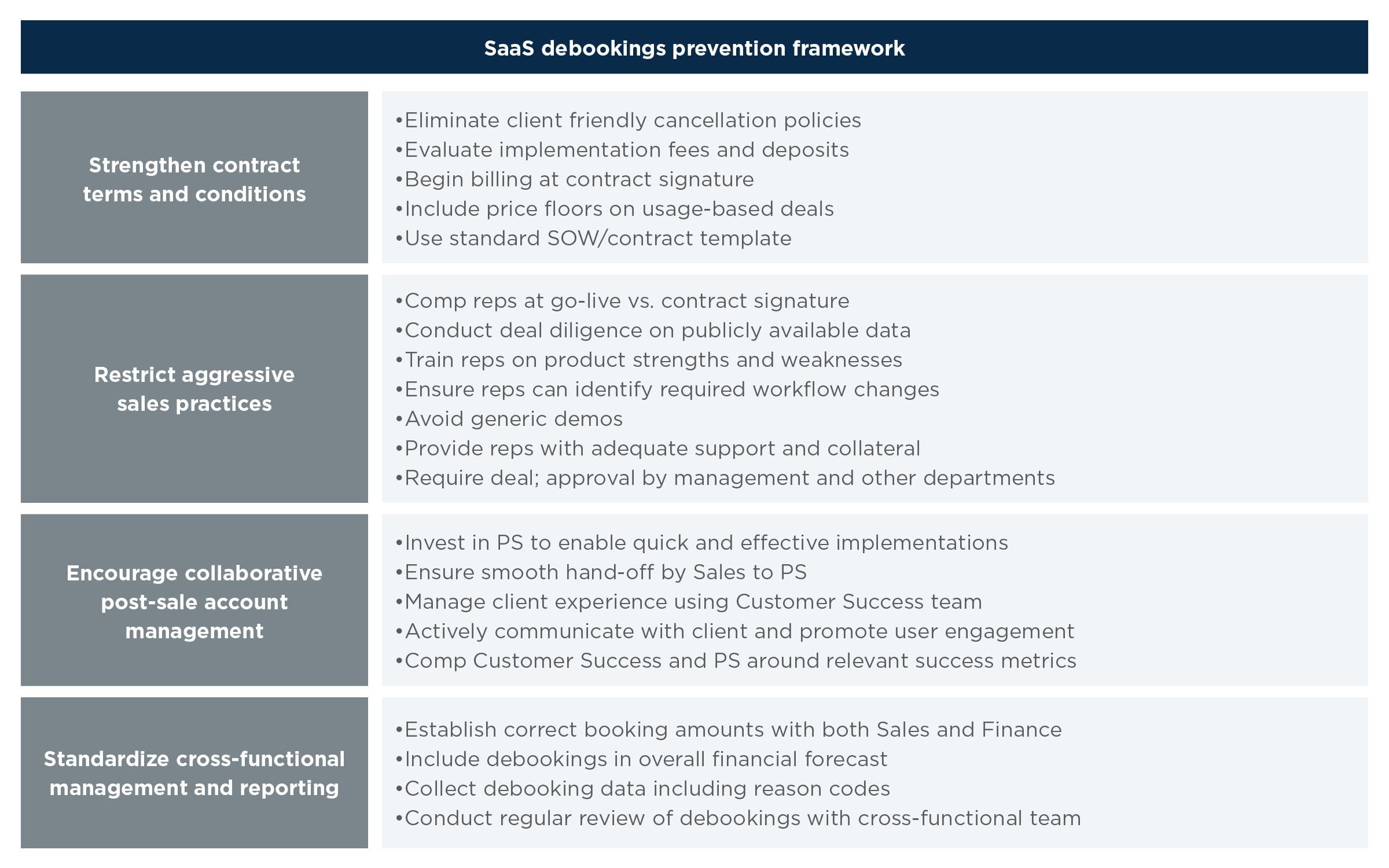
Oct. 1, 2018 | InBrief
The guide to SaaS deboookings – Part 2: How to prevent debookings
Debookings are a common yet significant problem for many SaaS providers that must be addressed and analyzed
The guide to SaaS deboookings – Part 2: How to prevent debookings
In our previous paper, The Guide to SaaS Debookings – Part 1: The Problem With Debookings, the term “debookings” was defined as sales that are recorded as bookings, but never materialize into revenue. For Software-as-a-Service (SaaS) companies, debookings can cause significant issues around financial forecasting, sales commissions, and wasted effort by Sales, Professional Services (PS), Finance and Legal. West Monroe has developed a SaaS Debookings Prevention Framework to help companies avoid these issues.
Preventing and managing debookings
Active prevention and management tactics are necessary across the entire customer lifecycle, but are focused on four key areas:
1. Strengthen Contract Terms & Conditions (T&C’s)
Eliminating customer-friendly cancellation policies such as “satisfaction guarantees” can shield vendors from a portion of debookings risk. However, while this may seem like a simple fix, vendors must strike the right balance between being customer friendly to win deals and enforcing harsh policies that hinder sales reps. By adding or enforcing cancellation policies, vendors must be willing to accept that they may miss out on some deals to prevent debookings, particularly if customer-friendly policies are standard in their industry.
There are several other tactics regarding T&C’s that can be used to prevent debookings if strong cancellation policies are not an option. Vendors can require implementation fees or even refundable deposits, making customers more likely to commit to a successful implementation. Vendors can also begin billing upon contract signature rather than at go-live, encouraging a quick start to implementation, mitigating pre-implementation cancellation risk while also accelerating revenue generation. To prevent downgrades, usage-based contracts can include price floors to ensure a certain level of ROI is achieved.
As a general practice, vendors should utilize standard SOW/contract templates to ensure consistency in these policies and prevent sales reps from sneaking in overly friendly terms to win a deal.
2. Restrict Aggressive Sales Practices
A healthy share of debookings typically comes from intentional or unintentional overpromising by sales reps to win deals. A rep might overpromise the software’s overall capabilities to help close a sale, or might bundle unnecessary additional modules to increase the overall deal size. To prevent debookings, it is critical that sales practices are in place such that reps paint an accurate picture of the software’s capabilities, structure the deal to match customer needs and do not pursue overly risky deals. The easiest way to influence sales rep behavior is through commission plans. Vendors that struggle with debookings should pay commission at go-live or once the revenue clock starts to prevent reps from overselling product functionality, ignoring risk factors such as third-party integration, or bundling in excess. This also eliminates the unpleasantness of having to claw back commission in the case of a debooking.
There are several tactics that can be used to ensure that reps are able to prevent issues that may result in debookings. A thorough diligence process should take place during the sale, if possible by leveraging any publicly available data such as customer employee count. A comprehensive discovery process helps determine the ideal customer/solution match – this is particularly helpful in preventing downgrades in usage-based deals. Reps should be adequately trained on product strengths and weaknesses so that they can give an accurate portrayal of functionality. Reps should also be willing and able to identify any workflow changes that will be required on the customer side to successfully utilize the software. They should be provided with support and collateral to help answer difficult technical questions. They should also avoid generic demos that do not answer questions that unsophisticated buyers (common in SMB) might have that result in eventual buyer’s remorse.
Finally, the proper governance and controls should be in place to prevent overpromising. In addition to requiring use of a standard SOW/contract, approval processes by sales management should be in place. In deals where there is a complex implementation or custom developments are required, it may make sense for PS or Product Development to be involved in the scoping process. At the very least, contract approvals by stakeholders outside of Sales should be required as necessary.
3. Encourage Collaborative Post-Sale Account Management
Steps must also be taken to ensure that issues that arise after the sale do not result in debookings. Companies should invest in their PS function to enable quick and customer-friendly implementations. Getting customers live on the software quickly and effectively can in itself decrease debookings risk.
The relationship and handoff between Sales and PS teams can be a source of problems and even cross-departmental friction. If Sales is not involved in the implementation process and issues arise after the handoff, Sales will naturally blame PS. However, PS might blame Sales if the implementation is unsuccessful due to issues like a workflow change being required that were not unearthed during the sales discovery process.
Having clearly defined cross-departmental rules of engagement around post-sales operations is key to preventing debookings. A clean handoff should be established with formal processes and controls where both groups feel accountable. There should be clear communication prior to implementation start, ideally through a joint kickoff call. After the handoff, PS should engage with Sales as necessary to prevent debookings. For example, if PS is having difficulty scheduling a start date with the customer, they should feel free to reach out to the sales rep who has the existing relationship.
Some companies effectively combat debookings by investing in a Customer Success function that oversees the entire post-sale customer experience. This team is often responsible for the overall customer relationship and works collaboratively with Sales and PS to ensure that the customer is quickly operational and satisfied along the way. Proactive customer management is key to preventing debookings. Once a deal has been signed, a mutually agreeable target implementation kick-off and go-live should be established. There must be active communication with the customer to make sure that they do not go cold before the kick-off. To prevent post-implementation cancellations, user engagement should be promoted right after go-live to make sure customers are getting proper value from the software. These activities are often quarterbacked by Customer Success.
Technology can also be helpful in realizing post-sale operations success. A CRM system can be leveraged by Sales to record customer information unearthed during the sales process that may be helpful to PS during the implementation. Also, if Sales feel they have limited visibility into the customer after the handoff, it may make sense to set up automated status updates so reps can follow their customers through the implementation process.
Finally, companies that struggle with debookings should examine compensation plans for groups not limited to Sales. Both PS and Customer Success teams can be incentivized to provide excellent post-sale account management through variable compensation based on metrics including customer satisfaction and time to go live.
4. Standardize Cross-Functional Management and Reporting
A certain amount of general management spanning across multiple departments is necessary to prevent and manage debookings. There should be active communication and set processes in place for Sales and Finance around establishing bookings amounts. Finance should also factor debookings into their overall forecast if they are common. Particularly for SMB customers, it may be unwieldy to forecast debookings at the individual deal level, so a baseline should be established using historical figures, and only material deals should be tracked individually.
Some debookings are caused by factors and may never be avoided, especially for SMB customers where acquisition and business discontinuation are common. But vendors that take a holistic approach to managing debookings are often successful in limiting their damage. Detailed tracking of debookings in a CRM using reason codes can provide great insight into why debookings are occurring and help identify trends. Reviewing this data with a cross-functional team and taskforce can be instrumental in limiting debookings, particularly since underlying causes typically span multiple departments.
Recognize and address your debookings
Our experience suggests that debookings are a common and significant problem for many SaaS providers and that they are rarely addressed in a systematic way. All SaaS companies should take a close look at their debookings to understand the economic impact that they have on their business. Once you recognize the extent of the problem, you can make a plan to address it.

